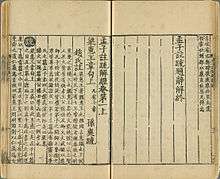Mencius (book)
 Early 13th century Mencius printing held in National Palace Museum | |
| Author | Mencius |
|---|---|
| Country | China |
| Language | Chinese |
| Genre | Philosophy |
Publication date | c. 300 BC |
| Mencius | |||||||||||||||||||||||||||||||||||||
| Chinese | 孟子 | ||||||||||||||||||||||||||||||||||||
|---|---|---|---|---|---|---|---|---|---|---|---|---|---|---|---|---|---|---|---|---|---|---|---|---|---|---|---|---|---|---|---|---|---|---|---|---|---|
| Literal meaning | "[The Writings of] Master Meng" | ||||||||||||||||||||||||||||||||||||
| |||||||||||||||||||||||||||||||||||||
The Mencius (Chinese: 孟子; Old Chinese: *mˤraŋ-s tsəʔ; pinyin: mèngzǐ),[1] is a collection of anecdotes and conversations of the Confucian thinker and philosopher Mencius on topics in moral and political philosophy. Mencius was a disciple of one of the students of Zisi, a grandson of Confucius, and the Mencius records his travels and audiences with the various rulers of the Warring States period, his students, and his other contemporaries.[2][3] A number of linguistic and textual clues suggest that the text was not written by Mencius himself but by his disciples,[2] probably during the late 4th century BC.[4]
The Mencius comprises 7 chapters, each divided into two halves, with alternating short sayings and extensive dialogues on specific philosophical arguments.[5] Its fundamental positions, such as Mencius' famous argument in chapter 6A that human nature is inherently good, are usually presented as conversations between Mencius and contemporaneous thinkers, while arguments on specific issues usually appear in records of his advice and counsel to various rulers.[5]
The Mencius was one of the most important texts of early Confucianism, and represents a notable advance over the Analects of Confucius (Lunyu 論語) in terms of sophistication of argument.[3] Notwithstanding its early importance to Confucianism, the Mencius was not canonized as one of the Chinese Classics until over 1000 years later during the Song dynasty.[3]
Selected translations
- Legge, James (1861). The Works of Mencius. The Chinese Classics, vol. 2. Reprinted (1895), Oxford: Clarendon Press.
- (French) Couvreur, Séraphin (1895). Oeuvres de Meng Tzeu (Works of Mengzi), in Les Quatres Livres. Ho Kien Fou: Mission Catholique.
- (German) Wilhelm, Richard (1916). Mong Dsi (Mengzi). Jena: Eugen Diderichs.
- Lyall, Leonard A. (1932). Mencius. London: Longmans, Green and Co.
- Ware, James R. (1960). The Sayings of Mencius. New York: Mentor Books.
- Dobson, W. A. C. H. (1963). Mencius, A New Translation Arranged and Annotated for the General Reader. London: Oxford University Press.
- Lau, D. C. (1970). Mencius. London: Penguin Books.
- ——— (2003). Mencius (New Bilingual Edition). Hong Kong: Chinese University Press.
- van Norden, Bryan (2008). Mencius: With Selections from Traditional Commentaries. Indianapolis: Hackett Publishing Company.
- Bloom, Irene (2009). Mencius. New York: Columbia University Press.
References
- Footnotes
- ↑ Wiktionary: Appendix:Baxter-Sagart Old Chinese reconstruction
- 1 2 Lau (1993), p. 331.
- 1 2 3 Shih & Knechtges (2010), p. 668.
- ↑ Kern (2010), p. 69.
- 1 2 Kern (2010), p. 70.
- Works cited
- Kern, Martin (2010). "Early Chinese literature, Beginnings through Western Han". In Owen, Stephen. The Cambridge History of Chinese Literature, Volume I: To 1375. Cambridge: Cambridge University Press. pp. 1–115. ISBN 978-0-521-85558-7.
- Lau, D. C. (1993). "Meng tzu 孟子 (Mencius)". In Loewe, Michael. Early Chinese Texts: A Bibliographical Guide. Berkeley: Society for the Study of Early China; Institute of East Asian Studies, University of California, Berkeley. pp. 331–335. ISBN 1-55729-043-1.
- Shih, Hsiang-lin; Knechtges, David R. (2010). "Mengzi 孟子". In Knechtges, David R.; Chang, Taiping. Ancient and Early Medieval Chinese Literature: A Reference Guide, Part One. Leiden: Brill. pp. 668–671. ISBN 978-90-04-19127-3.
External links
 Works related to Mencius at Wikisource
Works related to Mencius at Wikisource- The Works of Mencius: Legge's English translation
- Mengzi Chinese text with Legge's English translation
- Mencius (Selections), translated by A. Charles Muller
| ||||||||||||||||||||||